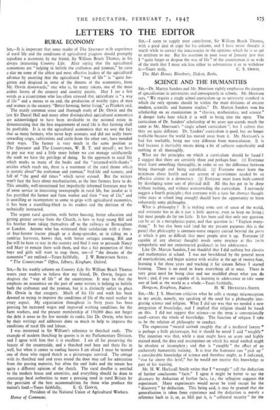SCIENCE AND THE HUMANITIES
SIR,—Dr. Martyn Sanders and Mr. Morrison rightly emphasise the dangers of specialisation in universities and consequently in schools. Mr. Morrison says, "We require a single school curriculum up to university standard in which the only options should be within the main divisions of ancient modern, scientific and humane studies." Dr. Martyn Sanders won his scholarship on an examination in " clasEics, mathematics, and science." A danger lurks here which it is well to bring into the open. The curriculum of Dr. Sanders' scholarship of 6o years ago sounds much the same as Mr. Morrison's "single school curriculum "; but I submit that they are quite different. Dr. Sanders' curriculum is good, but no longer workable because the world has moved away from it. Mr. Morrison's is bad but workable, being not very different from matriculation. It is bad because it inevitably means doing a lot of subjects superficially and nothing at all thoroughly.
What are the principles on which a curriculum should be based ? I suggest that there are certainly three and perhaps four. (i) Everyone must learn something thoroughly, in order to see the difference between being thorough and being superficial. (2) Everyone must learn tho minimum about health and our system of government needed by an effective citizen in a democracy. (3) Everyone must learn body-control by developing sonic sort of physical skill All this has got to be done .without rushing, and without overcrowding the curriculum. I nervously suggest a fourth principle ; that everyone with a taste for abstract thought (who stays at school long enough) should have the opportunity to learn voluntarily some philosophy.
What is philosophy ? It is making some sort of sense of the world, and everyone has to do it just a little anyway, even to keep on living ; but most people do far too little. It has been said that only one question can be set in a metaphysics paper, and that question is: "Explain every- thing." It has also been said (and for my present purposes this is the point) that philosophy is common-sense enquiry carried beyond the point at which it gets so difficult that most people give it up. Everyone (if capable of any abstract thought) needs some practice at this (with sympathetic and not uninstructed guidance) in late adolescence.
Like Dr. Martyn Sanders, I am thankful that I did nothing but classics and mathematics at school. I was not bewildered by the general mess of matriculation, and began science with avidity at the age of twenty-four, learning it for three years and teaching it for sixteen Before I started farming. There is no need to learn everything all at once. There is very great need for being clear and not muddled about what you do learn ; and, if you are capable of it, learning in adolescence to take some sort of look at the world as a whole.—Yours faithfully,


































 Previous page
Previous page